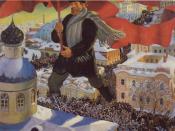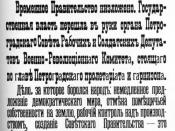Assess the role of Lenin in the Bolshevik seizure of power and consolidation of power in 1917.
In any account of history, it is difficult to determine whether individuals or historical forces beyond the control of the individual played the important roles. There is the argument that the actions of great individuals created the turning points in world history. Aligned with this is the historical argument that it was the activities of Lenin in October 1917, which explains why Russia was a communist nation for so many decades. On the other hand it can be argued that history is directed by natural forces beyond the control of any human; accidents, fate, economic developments, mass movements and so on. In this case it is difficult to see historical figures as anything more than insignificant actors in the play of destiny, mere "labels giving names and faces to events."
On Lenin's return from Switzerland on April 3rd 1917, he announced his belief that the soviet should overthrow the capitalist government and take power in its own name and for its people.
The vast majority of his party opposed him. Despite heavy opposition and furious argument against it, Lenin's April Thesis convinced the party agreed that the need existed to press on toward an anti-capitalist revolution. The decision to pursue revolution at the time was against the majority of the Bolshevik party and as such without the influence of Lenin, it seems clear that the party would not have even attempted revolution in 1917.
Lenin's April theses were also important in securing the growing popular support for the Bolshevik party. Having committed themselves to overthrow of the Provisional Government, the Bolsheviks had refused to compromise with the capitalist/landowners of the Provisional Government, as all the other socialist parties had done. Once they...


